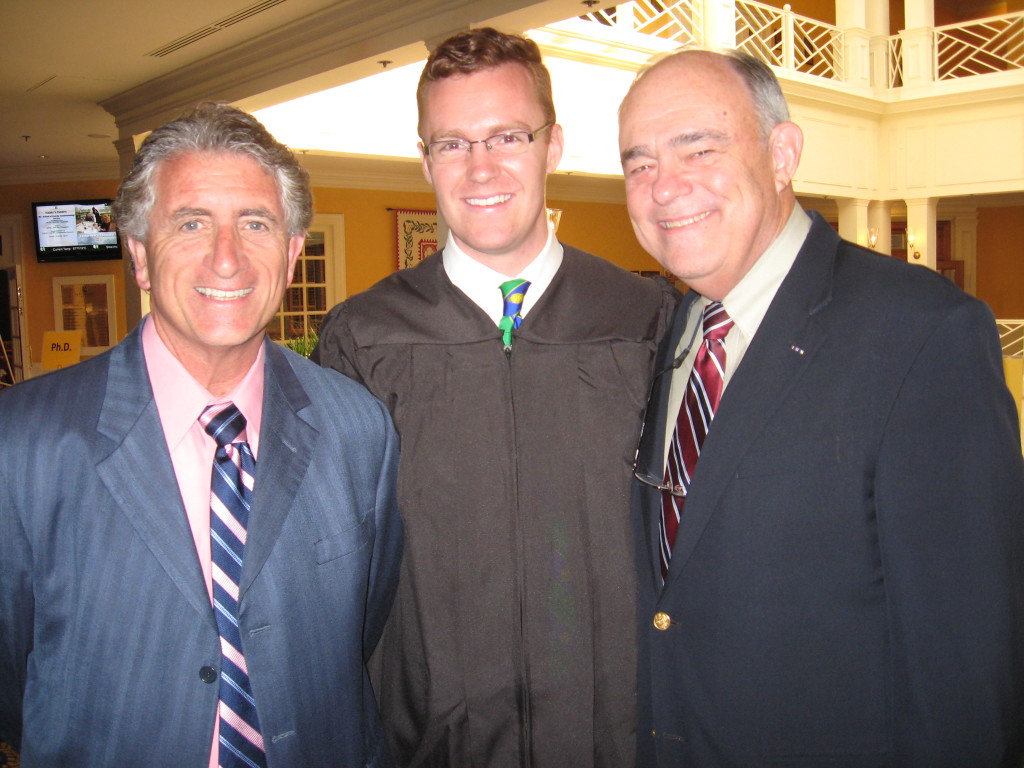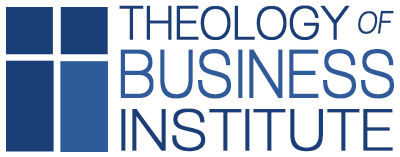How I Went from Seminary into Business (Darren’s Story)


(In 2010) With my father (Dr. Bob Shearer, right) and professor (Dr. Joseph Umidi, left) just before my graduation from seminary at Regent University in Virginia Beach, VA.
When I once shared with a businessman that I was in seminary, studying theology in preparation for going into business, he responded without hesitation, “Does that mean you’re planning to become a televangelist?”
Many of my fellow Christians have been equally as baffled as to how theological training is relevant to the marketplace.
In this article, I want to share with you how and why I went from seminary to business school and owning my own company? It might surprise you to know that this career path has been mostly deliberate rather than accidental.
Taking the boundaries off of ministry
As the son of a pastor and a music minister, I grew up in church in Columbia, South Carolina, thinking that “ministry” was something that happened inside the four walls of a church building.
Following the attacks on the World Trade Center on 9/11/01, I joined the U.S. Air Force as an officer to serve my country. However, I didn’t view it as a context in which to serve God…at least, initially.
To be sure that I was doing “ministry work” while I served in the Air Force, I served in as many church ministry positions as time permitted. I became a part-time youth pastor in a local church. I led a teams of young adults on evangelistic street outreaches in downtown Shreveport, Louisiana. I led the worship music for a church service at a Spanish-speaking church. I served as a parking lot attendant at my church on Sunday morning. I did everything I could to reassure myself that I was “doing stuff for God.”
As I was leaving Barksdale Air Force Base (Bossier City, Louisiana) after work one day, heading to serve at my local church, God spoke to me. He said, “Your ministry is on this Air Force base.” In that moment, exiting through the gate of my workplace, God took the limits off of my definition of “ministry.”
From that point on, I began to witness God revealing himself to my brothers- and sisters-in-arms in our workplace. They were asking questions about the Christian faith. They were getting saved. They were growing as disciples of Jesus.
I began to realize that the workplace is where disciples are made. That’s where we spend our time, and that’s where lifestyles are modeled and observed.
The most important thing I learned in seminary
Following the Air Force, God opened the door for me to attend seminary for theological training at Regent University (Virginia Beach, VA). Unlike 99% of my classmates, I didn’t enter seminary with the goal of becoming a seminary professor, pastor, or the leader of a faith-based nonprofit. I viewed seminary as a launchpad for ministry in the marketplace. I approached seminary with the understanding that my ministry would be primarily in the marketplace… not inside a religious institution.
Although 85% of most pastors’ congregations work in for-profit companies, there weren’t any classes about the “Theology of Business” in my seminary. There weren’t any classes about how to help the members of your congregation to use their spiritual gifts in their workplace. After all, pastors usually do not have backgrounds in business, so how could they understand the daily experience of a business professional well enough to disciple them effectively in a marketplace context?
Although I was able to focus my research papers in seminary on topics related to Christianity in the marketplace, I had hoped that my seminary courses would have provided more curriculum that would help me to understand God’s redeeming plan for the marketplace.
Although my seminary experience ultimately fell short in this respect, I did have an incredibly enriching learning experience as I gained a broader understanding of who God is and what He has done through the centuries… I believe that my primary purpose for attending seminary was to make one important discovery.
Through a course titled “Biblical Models of Discipleship,” God revealed to me that my primary responsibility as a Christian is to make disciples of Jesus. This is the Great Commission: “make disciples of all nations” (Matt. 28:19). It’s not necessarily about getting people inside churches. It’s not about making money for noble purposes. Yes, those things are part of it. Ultimately, it’s about making disciples, showing people what Jesus looks like. It’s about knowing Him and making Him known through every aspect of our lives.
Starting a business to make disciples
Not only did God call me to work in the marketplace, he called me to start businesses. As I learned in seminary, the entire purpose for these businesses would be to make disciples of Jesus.
When I was working for other employers, I was limited in the way I could express my spiritual gifts and calling. I had to do what my boss wanted me to do. Entrepreneurship, on the other hand, has given me the freedom to do exactly what God has called me to do… and in the way He has gifted me to do it.
Following seminary, I went to business school at Pace University (New York, NY) where I became immersed in today’s entrepreneurship culture. At first, I thought the only respectable businesses one could start were tech companies that required millions in venture capital funding (i.e. Facebook, Google, etc.). For this reason, most of my efforts to start my company were focused on pleasing investors rather than on pleasing God by doing what He had called and gifted me to do. I had been trying to start a business that was focused more on what seemed to be popular, profitable, and “disruptive” rather than on how God had gifted me.
During that season in business school, I began to take a hard look at who God had created me to be. To figure out which business God wanted me to start first, I started to ask soul-searching questions like,
- What type of work gets me excited?
- What type of work am I good at?
- As I look back over my life, what type of work has God been preparing me to do?
My responses to these soul-searching questions led me to start a publishing company. I had been an English major in college, taught academic writing to graduate students, edited numerous doctoral dissertations, and had written and published my own book. In addition, I enjoy marketing and had served as the marketing director for a nonprofit.
Starting a publishing company enabled me to launch a company immediately, without investors or lenders. I got married in 2012, so I couldn’t wait around for investors any longer. I had to begin something immediately. My company cost very little to get started, and I was able to build it while working a full-time job in marketing. I started the company in 2013 with $100, and it has already provided enough income for me to work from home and allow my wife to be a full-time mom for our baby son.
The name of my publishing company, High Bridge Books, was inspired by the “High Bridge,” which connected my former neighborhood in Manhattan to the Bronx. Still the oldest bridge in New York City, it was built in 1848 as an aqueduct to provide water to the citizens of Manhattan.
As the High Bridge provided life-sustaining water to the masses, High Bridge Books helps authors to provide life-changing books to the world. Through the more than 70 books that our authors have published since 2013, we have helped to make disciples of thousands of people.
You don’t have to create “Christian” products to make disciples through your business. I realize that the main way I make disciples through my business is through how I reflect the character of Jesus through the service I provide for my clients.
This company has also provided the financial means for me to be able to provide the Theology of Business podcast and blog for Christian business leaders like you. My goal is to help marketplace leaders to partner with God in their businesses to make an impact for Christ in society and in eternity. One of the greatest joys of my life is to create this podcast for you each week and have life-changing conversations with the guests that I have on this show.



